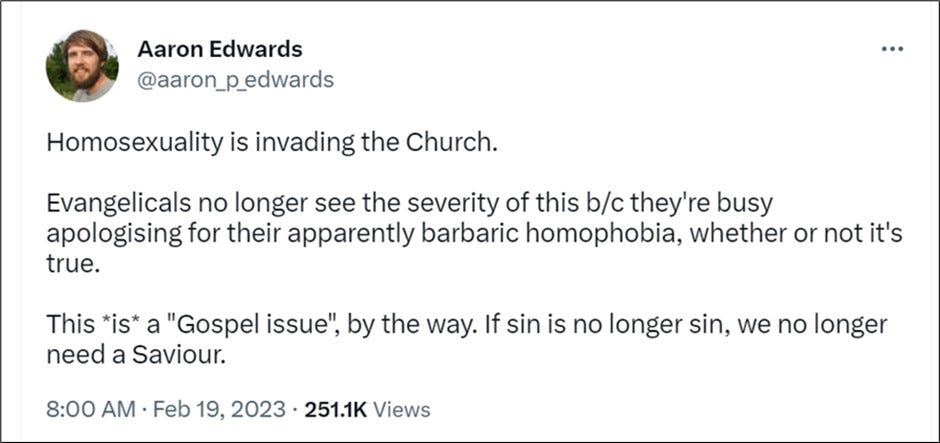How should Christians defend their beliefs when challenged? What counts as “appropriate” or “inappropriate” tone for Christians to adopt in public statements or debates?
Most Christian leaders in recent years have emphasised the necessity of softer, non-confrontational approaches to sharing faith or responding to opponents. ‘Softer’ may not always be wrong, of course: “A soft answer turns away wrath, but a harsh word stirs up anger.” (see Prov. 15:1). Such answers may well be very effective in personal conversation, but when this becomes the default mode of public interaction there are usually underlying problems. Christians who soften their expressions for too long may find they’re no longer able to “contend for the faith” (Jude 1:3) when the time comes to do so.
Most Christian leaders across Church history would find it shocking that Christians even need to contend for the idea of “contending”. How did we get to this point? Why is robust confrontation almost always seen as a “bad witness”? This ought to raise all sorts of other questions about the appropriateness of our default mode of engagement. Why is gentle winsomeness always deemed to be the “wise” option, by the way? When does so-called “appropriate” speech become inappropriate?
On Inappropriate Tweets
In case anyone needed reminding, this was my highly “inappropriate” tweet for which I was fired from an evangelical Bible college a few weeks ago:
The college swiftly and publically condemned my language as both “unacceptable” and – here’s that word again – “inappropriate”. The Tweet was deemed so inappropriate, in fact, that my refusal to take it down led to the college declaring it had been “brought into disrepute” as a result. Quite why an evangelical college finds the expression of evangelical opinions so disreputable remains a mystery to many, but all may have been different if only I had expressed such an opinion with different language that made it sound slightly less like the opinion that it was. As I argued in an article for Premier Christianity, many western Christians now seem to live by an apocryphal eleventh commandment: “Thou shalt not use inappropriate tone”. It would seem Christians can mock the Bible, hang Pride flags on pulpits, and host drag queen shows in church sanctuaries, but heaven help you if you talk about any of these things using strong words.
What do we actually mean when we say “inappropriate”? The word is often brandished like a judge’s hammer, crashing down instantaneously upon the words or actions of any poor soul who happens to fall foul of the latest ever-changeable socio-political conventions for speech. Synonyms for “inappropriate” could be: unfitting, unhelpful, unwise, crass. No doubt there are a great many things Christians say which should be said differently, or not said at all. But Christians who are awake to what is going on in our time need to think about shifting the invisible boundaries of what constitutes appropriate or inappropriate speech. This is because we take our orders from the Bible, not from evangelical platform specialists.
The Sin of Strong Tone
Here was one such offering in response to my tweet, from a fairly prominent evangelical leader in the UK. Notice in particular the “tone” at play…
It seems my greatest transgression was a failure to repent of the sin of heavy-handed phrasing. I can’t remember precisely where that came up in the Ten Commandments or the Sermon on the Mount but I’m sure it must be in there somewhere. Notice also the implied assumptions:
1. Backing down from your conviction is the “gracious” thing to do;
2. Apologising and withdrawing is the Christian thing to do.
This is now the common convention on mainstream Christian Twitter. If the mob come after you, the honourable thing to do is shrink back, grovel for mercy, and – if possible – self-flagellate. If you don’t, you are automatically deemed to lack humility, grace, Christlikeness, etc.
In later tweets the same author continued to accuse me of the even greater Twitter sin of "doubling down". This is another one of those phrases you might be forgiven for thinking must be in the Bible somewhere, given how frequently and sternly it is wielded by one’s opponents. Essentially, if anyone is foolish enough to defend their convictions in public today, one is “doubling down”. And if you refuse to stop doubling down – by continuing to defend your convictions when challenged by other convictions – how does our friendly fella respond? Well, he doubles down on telling you to stop doubling down, of course. The trick is to make comprehensive domination sound like a friendly arm around the shoulder. What they mean to say is: “Just shut up and agree with me!” But naturally, progressives and fauxvangelicals would never dare to speak with such inappropriately toned directness. They have other ways of getting their way.
How to Speak to an Invasion
The most apparently “harmful” aspect of my tweet seems to have been the word “invading”. How else would they like it said? Infiltrating? Creeping in? Assailing? Bombadeering? Or do we not really believe it’s a problem? Should we welcome the arrival of the sin of homosexuality within the Church? Is it something we should celebrate? Are we supposed to put on a great feast as the secular Pride band marches its way into the city of Zion and brazenly sets up shop? If we are not willing to celebrate it openly with the liberals, what should we call this sudden arrival? What are the appropriate words Christians should use for when the aggressive influence of the world has been allowed to take root among God’s people?
Sometimes, we must be frank. When there is a severe situation, severe words should be used. As my pastor helpfully preached about at our church on the Sunday after my tweet, if there’s a fire, those in the building need to be made sufficiently aware of it. What they need is an alarm - preferably, a loud and clear one. It is not a time to chastise the people who sound the alarm on the grounds that it is too loud for the delicate ears of some. It is a time to prepare people for action. “And if the bugle gives an indistinct sound, who will get ready for battle?” (1Cor. 14:8).
So, when rainbow flags parade up to the altar of your church, and someone makes a noise about why no one is doing anything about it, the one making the noise ought to be the one you listen to. The cry of “alarmist” is often used (rather loudly, as it happens) to raise the alarm against alarm-raisers. This has protected the compromisers for far too long. Our churches have become replete with passive enablers who quietly declare “‘peace, peace!’ when there is no peace” (Jer. 6:14). In reality, it is those who raise the alarm when they ought to who truly seek peace. That is precisely why they must call out sinful toleration among the people of God. As Jesus says elsewhere, equally inappropriately: “But I have this against you, that you tolerate that woman Jezebel, who calls herself a prophetess and is teaching and seducing my servants to practice sexual immorality...” (Rev. 2:20).
Jeremiah does not hold much back when he speaks boldly and clearly against the religious elites who know their lines: “Do not trust in these deceptive words: ‘This is the temple of the Lord, the temple of the Lord, the temple of the Lord.’” (Jer. 7:4). Speaking holy-sounding things does not make those things holy. Those who seek to undermine the reality of the truth of God’s Word will usually do so under the guise of a friendly and diplomatically “appropriate” demeanour. But it’s false. It's telling people things are fine when they are not. If you don’t believe that homosexuality has a place in the Church, then what we are seeing is an invasion of the Church. We must speak what we believe, for the good of the Church, for the good of the truth, and for the good of those on all sides who have been deceived.
Too many Christians have a problem with offensive-sounding militaristic language. They have been taught to be inherently suspicious of it. They assume that using such language can only ever be thoughtless, callous, and loveless. The problem is, there’s an awful lot of militaristic language and narrative in the Bible. An awful lot. The Old Testament alone ought to bring God into disrepute with many professing Christian institutions today. Perhaps they might have hoped that the New Testament could have gone to the trouble of undoing the damage done to God’s brand. But arguably, the New Testament – though generally rejecting physical violence – makes the militaristic connotations “worse” by ramping them up even within the scope of the New Covenant. And let’s not forget the way Jesus returns at the end, on a big white horse and with a very sharp sword (Rev. 19:11-16). It’s highly inappropriate stuff.
Twitter-Mobbing the Apostles
I do often wonder how not only the Prophets but also the Apostles - and even the Saviour himself - would have fared on Twitter today. I expect they would have found it difficult to avoid castigation by the religious authorities, not least for their tone. Jesus told false teachers who cause little ones to stumble to essentially commit suicide by tying a millstone around their neck and jumping into the sea (Matt. 16:8). Paul refers to the teaching of Hymenaeus and Philetus as “gangrene” and tells Christians to avoid them (2Tim. 2:17). Is this not “heavy-handed” phrasing? Is this not disreputable? Does this not sound “ungracious” by contemporary standards? Indeed, when Paul challenged Peter’s hypocrisy “to his face” in Galatia (Gal. 2:11), should Peter have told Paul to stop doubling down and be “gracious”? Being gracious does not mean backing down and shutting up when something needs to be said.
At the very least, you’d think God might have considered it wise to have taken down many of the verses in the canon which might cause offence to the delicate ears of future generations? God, it seems, doubles down when he means what he says. We should not be afraid to stand by our convictions when we are convinced they are in line with His convictions. And yes, this even means standing by our “inappropriate tone” if we believe it’s the right thing to say, the right time to say it, and the right way to say it.
The Bible chastens our aggression as well as our cowardice. We are called to be gentle and gracious as well as bold and clear. The problem is when one way always seems to win out and the other emphases are quietly airbrushed out of the Bible. Quite simply, many of the “laws” enforced by the Christian tone police today are just made-up. Some of them could even be seen as akin to the “human traditions” of the Pharisees which Jesus challenged so strongly (Mark 7:8). Again, we must ask: why didn’t Jesus give them the benefit of the doubt? Why did he have to seem so rude?
Who told you that you’re never allowed to talk the way the Bible writers talk? Who told you that particular words are never “appropriate” to speak of sin forcing its way into acceptance within the body of Christ? Where did we get the idea that cautionary niceness was the exclusive way to talk Christian? For too long our ears have been attuned to the expectations of this world and not nearly attentive enough to what the Word of God actually says and how it says it.
Inappropriate Responses?
It’s worth noting, by the way, that I have also had people contact me about the language of my tweet (and my defence of it), saying they have now decided to return to God because it woke them up to their own lack of conviction. Others have even said they will now try going to church for the first time in their lives. Perhaps I ought to tell them how inappropriate it was of them to have been convicted by such inappropriate language.







